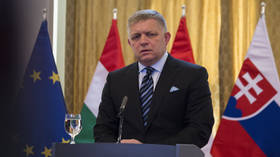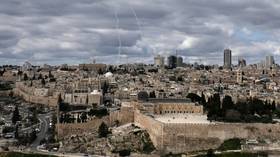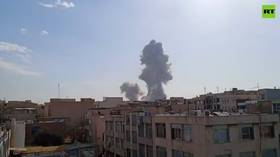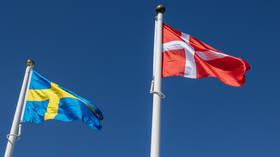131 killed as 2 blasts rip through Ramadan crowds at Baghdad shopping areas (PHOTOS, VIDEO)
Two blasts have ripped through busy market areas in Baghdad, Iraq’s capital, killing at least 131 people and injuring 200 others. Islamic State has claimed responsibility.
Interior Ministry spokesman Saad Maan confirmed that the first blast had come from a suicide truck bomb.
"It was like an earthquake. I wrapped up my goods and was heading home when I saw a fireball with a thunderous bombing," eyewitness Karim Sami told AP. "I was so scared to go back and started to make phone calls to my friends, but none answered."
Breaking : a suicide bomber targets busy Karada district in #baghdad and targets an eatery and a busy market pic.twitter.com/97B9OboFeD
— Steven nabil (@stevoiraq) July 2, 2016
Eyewitnesses said on Twitter that many shops burned down as a result of the explosions, and there are fears that the number of casualties could grow.
Karrada, an upper middle class district in the Iraqi capital, is mostly inhabited by Shia, but also has quite a large Christian minority. The area becomes very busy after sunset during the holy month of Ramadan.
Another day, more Muslim murders #BanIslam RT @Khaqani_M: suicide bombing in #Baghdad's Karrada earlier. #Iraqpic.twitter.com/AM1RlIRrYj
— MakeReligionsPayTax (@ReligionRetards) July 2, 2016
Shortly after the explosion hit Karrada, eyewitnesses said that a second blast targeted the Shaab neighborhood, which is located in the northern part of the city.
AP said that at least five people were killed in that bombing and another sixteen were injured. Meanwhile, Sky News Arabia said a suspected homemade explosive device was used to hit a market.
#الكرادة#Baghdad#Iraq Dozens injured and killed as ISIS suicide bomber blow himself inside a crowdy restaurant. pic.twitter.com/lOLrng8mgc
— Josiah(ܝܘܫܝܐ)♰ (@josiahalessoy) July 2, 2016
Islamic State (IS, formerly ISIS/ISIL) has in an online statement claimed responsibility for the attack in Karrada, Baghdad.
The tactics resemble Islamic State’s signature, as the terrorists frequently choose Shia-populated civilian areas in the capital as targets.
Iraqi security officials are attempting to restore order amid the state of panic that has ensued following the attacks, Altaf Ahmad, a local journalist, told RT.
“Major roads leading to the venue of the explosion [in Karrada] have been cut off. We know that the car bomb that went off in the area that is known to be crowded at this time. After sunset, after the break of fast during the holy month of Ramadan many people start to go out... We are expecting that the number could rise to 100 casualties,” Ahmad said.
Terrifying scenes. #Baghdadpic.twitter.com/8cqIduPC75
— Mustafa Al-Khaqani (@Khaqani_M) July 2, 2016
Meanwhile, Abayomi Azikiwe, editor at Pan-African News Wire, said the pattern of bombing in Baghdad reminded him of what happened in Istanbul.
“There is some affirmation that Islamic State claimed responsibility for the attack. This follows a pattern for the last week with the attack in Istanbul. The sectarian divisions inside the country have exacerbated and there’s been a reaction on both sides,” Azikiwe told RT.
He also noted that Islamic State had suffered tremendous losses over the past several months and could be committing such attacks in order to avenge their retreat.
“They moved to other geopolitical regions, in Libya, for example, in western part of the country. A lot of these attacks are done for propaganda reasons,” he added. “[These attacks] definitely appear to be coordinated.”
Earlier this week, at least 12 people were killed and 32 injured in another suicide attack west of Baghdad, where an attacker wearing a suicide vest targeted a Sunni mosque in Abu Ghraib.
READ MORE: At least 12 killed in suicide attack on Abu Ghraib mosque
Islamic State was recently pushed out of Fallujah by Iraqi forces, but the terrorist group still controls Mosul, Iraq’s second largest city, which is located in northern Iraq.
Big explosion rocks Shia-district #Karrada in center of #Baghdad moments ago. #Iraqpic.twitter.com/n9fgbfc9YU
— F. (@7layers_) July 2, 2016












